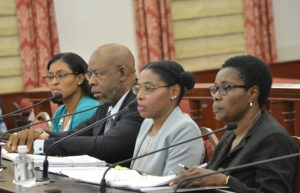
With its budget slashed by 17.5 percent for the upcoming fiscal year, the Department of Planning and Natural Resources is spreading the loss across different categories within its budget, including an almost $1 million cut for personnel and fringe benefits.
On Tuesday, DPNR Commissioner Dawn Henry testified before the Senate Finance Committee that the cut, mandated by the Office of Management and Budget, meant a 7 percent decrease in its operating budget alone. Compared with last year, general fund appropriations for personnel went from $3.9 million to $3.1 million, and fringe benefits dropped from $1.8 million to $1.57 million. Fringe and personnel combined amount to $5.09 million, which will be used to fund salaries for 206 positions within the agency.
DPNR’s recommended budget for Fiscal Year 2018-2019 is $31 million. Of that, $19.7 million – about 63 percent – is federal money, while about $6.5 million, or 21 percent, comes from the general fund. The remaining 16 percent comes from non-appropriated local funds.
The decline in personnel budget also highlighted the inadequate number of DPNR enforcement agents tasked with enforcing environmental, boating safety and permitting laws of the territory. Henry said that Environmental Enforcement Division Director Howard Forbes, Sr. recommends having 10 enforcement agents on each district. Currently, DPNR is operating with four agents for St. Thomas-St. John, and four agents for St. Croix.
DPNR is also waiting for OMB to enter roughly $7.3 million in federal grant money so it can begin the process of hirng 19 additional technical staff. These positions would be maintained within the six-year timeframe of the federal grant.
Henry indicated that any union-negotiated salary increases would be funded outside of DPNR’s budget and would not be impacted by the reduced personnel funds.
“My understanding of the process is that through the negotiation process they are having with the union, whatever number that they determine that the government can fund … at that moment, OMB would make the allocation to the various departments that would require the increase,” said Henry.
When asked if non-union employees would also receive promised salary increases, Henry responded, “According to the government’s statement, all the employees.”
Lawmakers also expressed concern about the sheer amount of DPNR’s receivables from delinquent leases, amounting to $2.16 million, which can offset the agency’s reduced budget. Tip Top Construction, for example, owes DPNR $550,000 for a 20-year lease ending in 2022 but has only paid $1,583.
“We’re having an issue with Tip Top because Tip Top is saying the government owes them money for services they provided so they are not paying DPNR,” said Henry.
“How do people get away with this?” asked Sen. Nereida Rivera-O’Reilly, stressing that Tip Top has a lease agreement with DPNR and should not be allowed to essentially charge DPNR for the government’s delinquent payments.
“We’re going to get aggressive with this particular lease about paying the money owed to [DPNR],” said Henry, saying the problem with Tip Top existed before the company’s “excuse that the government owes them money.”
Finance Committee Chairman Sen. Kurt Vialet responded, “I think we need to get aggressive with all of them.”
The St. Thomas-St. John Committee of the Historic Preservation Commission, which falls under the umbrella of DPNR, presented its budget this year for the first time. Its chairman, Felipe Ayala II, said the Commission has suggested a budget for three years, but never had the opportunity to present it before the Senate.
“From the inception of the commission’s existence, it has never had any fiscal allocations made toward its sustainability,” said Ayala. “The money received by the commission are for monthly stipends disbursed to members of the commission that attend application review meetings.”
Even those stipends remain in backlog, according to Ayala. This year, HPC is asking for $175,000, the bulk of which would go toward public outreach – $60,000 – and a $51,000 salary for a preservation technician.
The Virgin Islands Council on the Arts also presented its budget, asking the senate for a $100,000 increase from last year’s appropriation. According to VICA Director Tasida Kelch, increasing the council’s budget from $325,000 to $425,000 will allow it to fund more grants and special projects within the territory’s artistic community.
VICA receives funding from the National Endowment for the Arts, which must then be matched with local appropriations from the V.I. government. For Fiscal Year 2018, NEA awarded VICA some $300,380 in grants.


